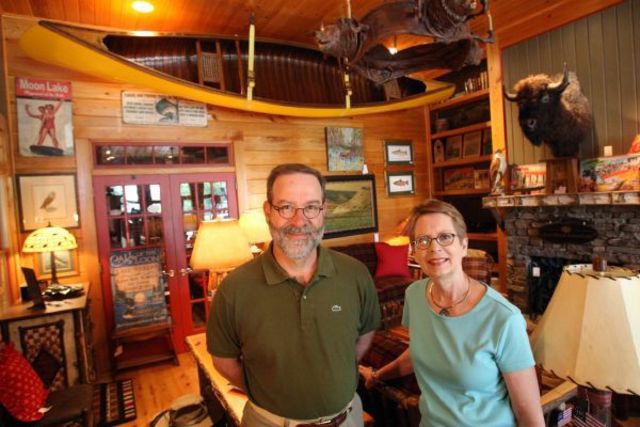
Author: Jonathan Devin
Publisher: Commercial Appeal
6/13/2011
Michael Baty isn't a big-game hunter, but his business keeps Germantown supplied with all the comforts of home -- including the occasional moose head.
Chestnut Hall Furniture, which Baty co-owns with his sister, Karen Rice, is among the small number of businesses that managed to turn a recession year into a banner year.
"2010 was a record year for us," said Baty, who opened Chestnut Hall 22 years ago. "We've attracted a number of new customers who have not shopped here before."
The siblings first worked in their parents' furniture store as children before Michael became a CPA and Karen became a home furnishings buyer for Goldsmith's.
After Goldsmith's changed ownership, Michael encouraged Karen to strike out on her own, thinking her creativity was going to waste.
Then he decided to come on board himself as a silent partner in a 900-square-foot single bay on West Street in Germantown, which opened in April 1989.
Six months later, they had already outgrown that space and added a second adjoining bay. Two years later, they expanded to a new building with almost 5,000 square feet.
Their parents, Fred and Dina Baty, came out of retirement to work for them and stayed on for 12 years, by which time Michael and Karen had decided to buy their current building on Forest Hill-Irene, which is 10,800 square feet.
Last year, they paid it off.
"It's a tremendous competitive advantage because most competitors lease their space and it allows us to be competitive in price," Michael said.
And any advantage is a great advantage during the recovery from a recession. He explained that the economic downturn's effect on home furnishings among all other American industries was to strip away competitors that rely solely on low prices.
"The great thing about buying things right now that are made in the United States is that we've had a pretty severe contraction in the home furnishings industry as to what is made here," he said. "The ones that got crowded out are the ones whose products didn't have merit."
While not all of Chestnut Hall's offerings are American, every American-made piece is marked with a paper tag bearing Betsy Ross' flag on one side and the specific location where it was made on the other.
That's not necessarily to attract customers who feel a backlash toward foreign goods, though. Rather, he sees it as a mark of quality.
The home furnishings industry never relocated to Asia like appliances, automobiles, or tech industries. The highest quality goods he said come from places like North Carolina.
"You only buy so much furniture in a lifetime and you keep it for a while, so if you're not attuned to what to look for, then things do look similar," he said. "Our job is to educate the customer to an extent and allow them to pick where they want to be in the gamut that's offered."
Sometimes simply choosing the right piece can be challenging for customers.
"I could tell they were looking out for my best interests," said Tracy Forsythe, who has been shopping at Chestnut Hall for the last 15 years. "Whether I had a $100 budget or a $1,000 budget it didn't make any difference. They could make it work."
She met with interior designers from Chestnut Hall in her home several times over the years and got tips for saving money like recovering older pieces and moving them from room to room rather than starting all over.
"I have to watch what I spend, but I've bought good quality," she said. "I've put my money in the right things and didn't waste money on the wrong things, and that's what they're so good at doing."
Michael said that Karen is the primary buyer for the store while he is in charge of operations. Lately though, he has added a bit of his own taste in the store's décor.
One end of the store is wood paneled and decorated with rustic hickory furniture, deer head trophies and earthy fabrics.
So far the store has not ventured far into the world of Internet sales because the siblings prefer to have an in-person experience with customers.
"You're either in that business or you're not, and I don't think we are," Michael said. "The folks here will go out to your house and make sure your selection works. Some people have a better eye for scale than others. So designers can tell you, yes, the color will look good.
"It's the feeling that when someone buys something, if anything happens they know it's going to be taken care of."